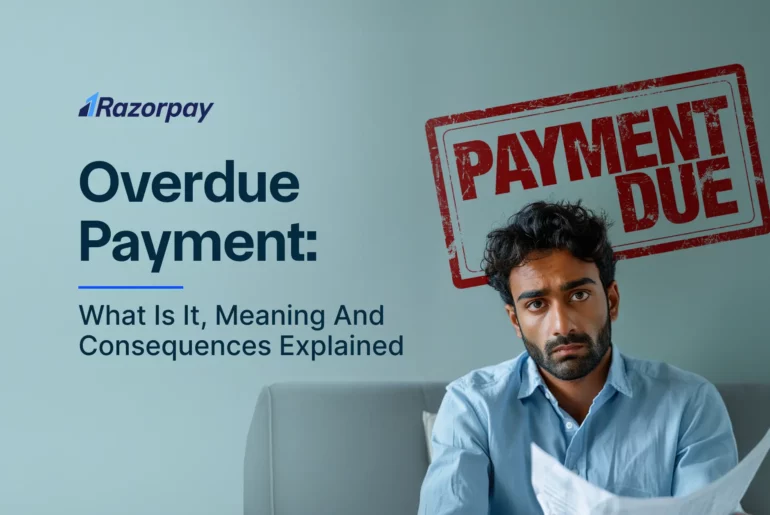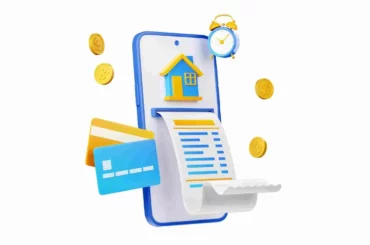Table of Contents
What is Overdue Payment?
An overdue payment refers to the amount not settled by the due date specified for a transaction. It is the amount that is not paid by the due date, generally after the grace period or based on agreed upon terms between the payer and the payee.
Overdue payments can refer to common financial transactions such unpaid invoices or pending dues, loans, mortgages, credit cards, vendor invoices, etc. They can be bills that aren’t paid on time or loan instalments unpaid within the agreed-upon time.
However, they have significant consequences for both the payer and the payee, such as late fees, interest charges, reduced credit scores, legal action, or loss of service.
What Are The Consequences of Overdue Payments?
1. Impact on Reputation:
Consistently failing to pay bills on time can erode trust and credibility with clients or suppliers, harming relationships and hindering future business opportunities. Such a pattern can tarnish your reputation as a reliable partner, affecting your capacity to attract new customers and retain existing ones.
2. Accrued Fees and Penalties:
One of the financial repercussions of overdue payments is the accumulation of additional fees and penalties. These costs can quickly escalate, putting a strain on your company’s budget. Late payment, interest and legal fees can worsen the financial burden caused by overdue payments.
3. Credit Rating:
Overdue payments can significantly impact a company’s credit rating. When one consistently fails to meet payment obligations, it reflects poorly on their creditworthiness. A lower credit rating makes getting a loan or line of credit from financial institutions more challenging. It limits borrowing capabilities and may result in higher interest rates or stricter terms for future financing.
Common Causes of Overdue Payments
1. Cash Flow Challenges
Cash flow challenges can often lead to delayed payments. For example, if a business is experiencing a temporary shortage of funds, it may need more time to pay its bills. This could be due to seasonal fluctuations in sales or unexpected expenses that drain available cash reserves.
2. Rapid Business Growth
Managing finances can become challenging during rapid growth and result in payment delays. For instance, if a company rapidly acquires new clients or expands its operations, it may need to process an increased volume of transactions, resulting in administrative delays and overlooked payments. Moreover, to attract new clients, businesses sometimes sell their goods and services on credit, which negatively delays the cash inflow and results in overdue payments.
3. Human Error
Human error can happen at any stage of the payment process. For example, raising an invoice to the wrong customer or with the wrong amount or due date. It also includes entering incorrect or incomplete information in the accounting system or the payment platform. Human error also occurs because of missing or delaying the payment due to forgetfulness, distraction, miscommunication or making mistakes in the calculation or verification of the payment amount or the balance.
These human errors not only lead to overdue payment but also confusion, disputes, penalties, or loss of trust between the parties involved in the payment process.
Also, make sure to verify whether you accidentally placed a stop payment on the cheque meant for clearance. If you are wondering what is a stop payment, it is a banking instruction to halt the processing of a specific cheque or payment. It is typically used when a cheque is lost, stolen, or has an issue with the payment.
Steps to Prevent Overdue Payments
1. Establish Clear Business Agreements
It is crucial to establish clear and detailed payment terms in your business agreements. Clearly define payment schedules, due dates, and penalties for late payments. By outlining these terms upfront, you can set expectations with your clients and minimise the chances of overdue payments. For example, you can specify that payments are due within 30 days of invoice issuance and impose a penalty of 2% per week for late payments.
2. Implement Ongoing Monitoring
Regular monitoring of accounts receivable is essential in preventing overdue payments. Utilise tools and systems that can track payment deadlines, such as accounting software or customer relationship management (CRM) systems. By monitoring your accounts receivable, you can determine any potential issues early on and take proactive measures to ensure timely payments.
3. Prompt Invoicing
Promptly sending out invoices after delivering goods or services can significantly improve your chances of receiving on-time payments. Clearly state the payment due date on the invoice and provide easy-to-follow instructions for making the payment, including options like payment links or late payment authorisations. Additionally, consider offering incentives for early payment, such as discounts or extended credit terms.
Outstanding vs Overdue Payments
| Outstanding Payments | Overdue Payments |
| Refers to unpaid invoices or pending dues | Refers to payments that are past their due date |
| Can be current or not yet due | Past the due date, usually after a grace period or agreed-upon terms |
| Payment may still be considered on time if it falls within the agreed-upon credit period | Payment is considered late and can attract penalties or interest charges |
How Can Businesses Reduce Overdue Accounts Receivable?
Managing accounts receivable effectively is crucial for maintaining the financial health of your business. Late payments can disrupt your cash flow and hinder your ability to meet operational expenses and invest in growth. To reduce overdue accounts receivable, consider implementing the following strategies:
- Improve Communication: Establish clear payment terms and communicate them to customers upfront. Send reminders before payment due dates and follow up promptly on overdue payments.
- Implement Credit Policies: Conduct credit checks on new customers, set credit limits, and evaluate their payment history. Enforce strict credit terms to minimise the risk of late payments.
- Offer Flexible Payment Options: Provide convenient online payment methods such as payment links or mobile wallets to make it easier for customers to pay on time.
- Use Debt Collection Techniques: If a payment becomes overdue, employ polite but firm debt collection techniques like sending formal demand letters or offering payment plans.
Conclusion
Managing overdue payments is crucial for businesses. Late payments strain cash flow, increase borrowing costs, and harm relationships with suppliers and customers. To maintain a healthy business environment, implement strategies like clear payment terms, flexible payment options, and a grace period for late payments to effectively manage overdue payments and protect your business’s financial health.
Frequently Asked Questions
1. What happens if you don’t pay overdue?
If you don’t pay an overdue payment, it can have both financial and non-financial consequences. Financially, you may be charged late payment fees or penalties, and your credit score could be negatively impacted. Non-financially, your reputation with the creditor may suffer, leading to strained relationships.
2. What is overdue with an example?
Suppose you have a credit card bill due on the 15th of each month, and you fail to pay by that date; it becomes overdue.
3. Is overdue the same as unpaid?
While an overdue payment is a payment that had to be made by the due date, an unpaid payment implies that no attempt has been made to make the payment.
4. What is the balance overdue?
Balance overdue refers to the total outstanding amount that has not been paid by its due date. This can include principal amounts, interest charges, late fees and penalties.
5. What is an overdue EMI Payment?
An overdue EMI (Equated Monthly Instalment) payment occurs when a borrower fails to repay their scheduled loan on time.



